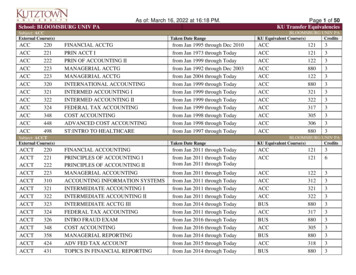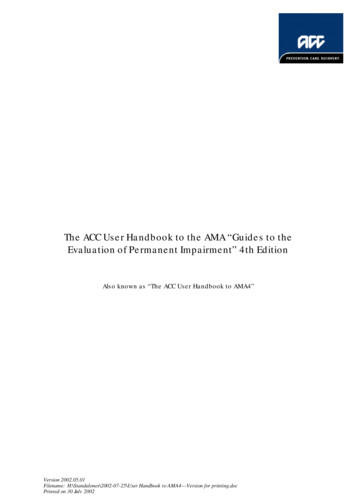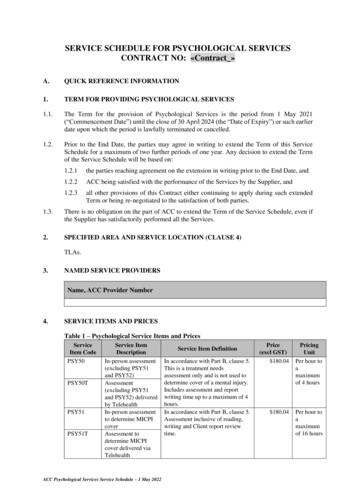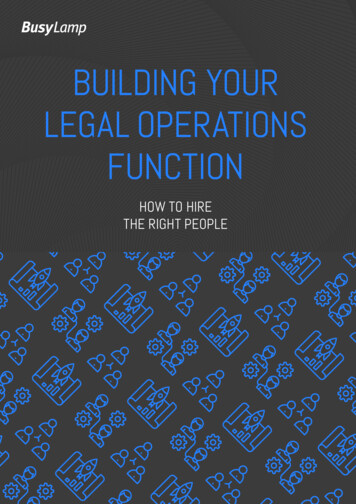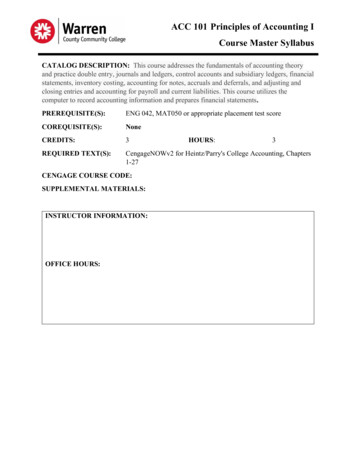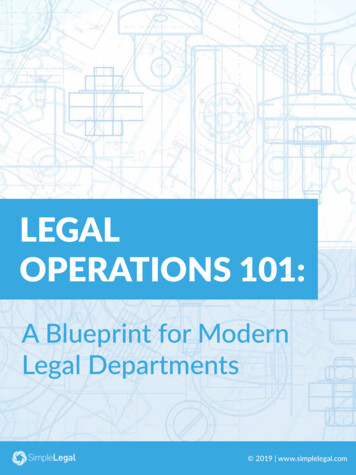
Transcription
LEGALOPERATIONS 101:A Blueprint for ModernLegal Departments 2019 www.simplelegal.com
TABLE OF CONTENTSINTRODUCTIONThe Rise of Legal Operations. 1THE FOUNDATION OF STRONG LEGAL OPERATIONS FUNCTIONSStrategic Planning. 2Financial Planning. 2Reporting & Legal Analytics. 2Vendor Management. 3Technology Enablement & Adoption. 3BUILDING OUT YOUR LEGAL OPERATIONS TEAMThe 3 Levels of Legal Operations. 4The Legal Operations Org Chart. 5Your First Legal Operations Hire. 5Sample Job Description. 7PROMOTING CROSS FUNCTIONAL COLLABORATIONFinance. 8Sales. 9Human Resources. 9Engineering. 9Information Technology (IT).10General Administration.10Case Study: AdRoll.11SUPPORTING LEGAL OPERATIONS & ENSURING LONG-TERM SUCCESSHave a Change Management Plan Ready.12Set Clear Expectations.13Legal Operations Management Platform Implementation.13CONCLUSIONABOUT SIMPLELEGAL 2019 www.simplelegal.com
INTRODUCTIONIn the early 1990’s, General Electric, Bank ofAmerica, and Prudential were part of a handful ofcompanies that employed dedicated legal operationsspecialists to better manage legal spend and driveefficiencies within corporate legal departments.Today, legal operations isn’t just a luxury reservedfor large organizations with the budget to expandtheir legal departments. According to the 2018ACC CLO Survey, 47% of law departments have aTODAY1990legal operations professional.THE RISE OF LEGAL OPERATIONSLegal departments are no longer asking whether to invest in legal operations. Instead,they’re interested in how to start building a team that will deliver positive outcomes.This white paper is a resource for: General counsel looking to set up a new legal operations function Legal team members taking over the ‘legal operations’ functions within their department Legal teams trying to improve their processes and modernizeReaders will be provided with a framework for the key responsibilities of the legal operations function,hiring best practices, integration strategy, and change management. 2019 www.simplelegal.com 1
THE FOUNDATION OF STRONGLEGAL OPERATIONS FUNCTIONSA strong legal operations function will champion innovationand change by building processes that drive greaterefficiencies, empowering your in-house attorneys to spendmore time on the actual practice of law. Legal operations is amultidisciplinary function that optimizes legal service deliveryto a business by focusing on areas such as:STRATEGIC PLANNINGLegal operations works with every part of the legal department, from the general counseland lawyers to paralegals (in every practice area), legal assistants, and admins. The functionwill be responsible for partnering with the GC to develop the long-term strategy for the legaldepartment and align the team and resources against these goals.FINANCIAL PLANNINGOne of the key aspects of a strong legal operations function is departmental budget management.Legal operations puts the process and system in place to track legal spend, accruals, and budgets inorder to identify cost saving opportunities. Close collaboration with the finance department is also anecessity to ensure compliance with any financial requirements.REPORTING & ANALYTICSStrong legal operations departments are data-driven. They have determined which KPIs are bestto track their team’s success, built in the data infrastructure to understand how spend is beingallocated across matters, and understand when to invest in outside counsel vs. leverage internalresources. Legal operations share these reports and communicate legal metrics to the executiveteam to build alignment across the organization and facilitate more informed decision making.Tracking legal spend, often done with modern e-Billing software, is a prioritized reporting initiativefor legal operations – especially given the pressure for legal departments to be data-driven andstrategic business partners to the organization. Once legal operations understands where eachdollar is being spent, they can focus on where they can optimize and reduce spend, and leveragepast project data to predict future costs. 2019 www.simplelegal.com 2
VENDOR MANAGEMENTVendors are the legal department’s strategic partners. The group largely consists of law firms, butin some cases they are consultants or specialists that support the work of the in-house team.Once legal operations exposes strategic and financial initiatives, they can leverage availablelegal data to evaluate whether their in-house team or outside counsel is best suited to handlethe work. When outside counsel is determined to be the best option, legal operations helpsto create a vendor management program that uses benchmarking metrics to evaluate outsidecounsel performance against communicated expectations. The program will also includenegotiating fee agreements, regular performance reviews with outside counsel, as well asimplementing and enforcing billing guidelines.TECHNOLOGY ENABLEMENT & ADOPTIONWe’re at a turning point in the industry with the way legal services are delivered, and the waytechnology is used in the legal field. Effective legal operations departments will introduce modernlegal tools and create a long-term technology roadmap that includes solutions such as e-Billingand matter management, contract management, IP management, electronic signature, legal hold,and more. Another key priority is creating an interconnected ecosystem where each independenttechnology can seamlessly share information from one system to another.LEGAL OPS EMERGES AS STRATEGIC PARTNERTO THE GENERAL COUNSELA growing number of general counsel are taking a seat on the board of directors, and arebeing called on to provide strategic advice that directly influences how the organizationoperates. Just as the Director of Sales discusses win rates and profits generated, andthe Director of HR discusses retention rates and recruiting and training expenses, theGeneral Counsel must participate quantitatively to emerge as a peer of those at theleadership table. No longer can legal simply acknowledge that money is going out thedoor because of a specific project or litigation.As a result, the outcome of a good legal operations team is to be a strategic partner tothe GC. The two will closely work together to define, launch, and drive initiatives thatprovide more visibility into outside legal spend, vendor performance, and legal spendmetrics. In many cases, e-Billing is the foundational tool to help gather data and positionlegal as a data-driven department. 2019 www.simplelegal.com 3
BUILDING OUT YOUR LEGALOPERATIONS TEAMThe scope of the legal operations role grows with the maturity of the legal operations functionwithin the department. Because of this, the role and responsibilities of legal operations leaders varyby company and will impact how you structure your legal operations team.THE 3 STAGES OF LEGAL OPERATIONSThe Association of Corporate Counsel (ACC) offers a Legal Department Maturity Model to helpbenchmark maturity in any given area. With this model in mind, you can better determine the levelof legal operations your department is ready for. From there, whether you are making your first legaloperations hire or building out your current team, you can view legal operations in three levels.LEVEL 1: THE MANAGERThe beginner’s level of legal operations is typically a manager who works to understandpain points and provide solutions to automate and streamline processes. They implementprocesses for prioritizing responsibilities, managing legal spend, and improving reportingfor data-driven decision making. They might also be responsible for putting in atechnology roadmap to increase productivity and transparency.LEVEL 2: THE OPTIMIZERThe mid-level of legal operations is all about optimization. The legal operations specialistworks more closely with vendors than an admin would. The goal of legal ops in this levelis to help each vendor better understand how they can do more for the overall business.It may also include working with IT and industry consultants to deliver any technologynecessary to fulfill the responsibilities of the position such as tracking, reducing, andreliably reporting on legal spend.LEVEL 3: THE STRATEGIZERThis level is what all legal departments should strive to achieve. Legal operations willwork closely with the many groups that work with legal (a topic we’ll be discussing inmore detail later in this guide) to accelerate processes given that certain activities mustbe done. Effective legal operations functions understand requirements, predict needs, andimplement solutions to ensure maximum efficiency and effectiveness. 2019 www.simplelegal.com 4
THE LEGAL OPERATIONS ORG CHARTWith an understanding of the three levels of legal operations, your next step is to hire someonebased on your company needs and the level of legal operations your department is ready for. Keepin mind that as your company and department grow, so will your org chart. Here’s an example ofhow legal operations can be built out at a mature organization.GENERALCOUNSELDIRECTOR OF LEGALOPERATIONSLEGAL PROJECTMANAGERLEGAL OPERATIONSMANAGERLEGAL BUSINESSANALYSIS ANDSOLUTIONS MANAGERPROJECT MANAGEMENTASSOCIATELEGAL OPERATIONSSPECIALISTBUSINESS SYSTEMANALYSTYOUR FIRST LEGAL OPERATIONS HIREWhen thinking about your first legal operations hire, you will likely have a handful of questionsaround what a top candidate looks like. In addition to driving peak operational performance, legaloperations leaders should be able to demonstrate: A strong understanding of the core business The ability to translate the needs of business departments into legal requirements Commitment to using the internal legal department to grow the company Expert knowledge of how to effectively manage law firm performanceFollowing are a few additional areas that you’ll need to evaluate when making your first legaloperations hire. 2019 www.simplelegal.com 5
PART-TIME VS. FULL-TIMEYour decision of whether or not to hire a full-time employee to manage legal operations willbe largely dependent on your legal team and organization size. Larger legal departments andcompanies will benefit from a full-time employee who can dedicate their time to creatingoperational efficiencies, selecting technologies and ensuring they connect with tools from otherdepartments, and implementing new, streamlined processes.ATTORNEY VS. NON-ATTORNEYLegal operations leaders are business people first, and lawyers second. In fact, a law degree isn’t arequirement to be successful in legal operations – though a legal background definitely providesvalue in conversations with law firms and attorneys. Because legal operations leaders are hired fortheir business management experience as much as for their legal knowledge, an individual may fallinto any of the following personas:The lawyer whohas chosen amore businessfocused careerpath1The uberanalystwho bringsquantitativerigor tothe legaldepartment2The MBAwho bringsoperationaland financialdisciplineto the legaldepartment3The highlyanalyticalJD/MBA whois valued forboth legaland businessexpertise4NEW HIRE VS. CURRENT TEAMOrganizations that don’t have a formal legal operations role don’t necessarily have to lookoutside of their department for a legal operations professional. In some cases, you might alreadyhave “half a legal operations manager” – someone who’s naturally become involved with vendormanagement, data analysis, or general operational processes. Their divided attention makes itdifficult to reach optimal operational efficiency, but moving them into the role of a dedicatedlegal operations manager can be a viable option. They’re already familiar with the current legaldepartment structure as well as operational processes and any technologies currently utilized sothere’s less training and knowledge share required.For smaller teams, there’s also great opportunity in enabling your current paralegals.Paralegals are closest to the work that’s being done by outside counsel. They have a strongunderstanding of your matters and invoice process, how they align with budget and spendmanagement goals, and often work closely with the general counsel so they have the strategicand business oriented perspective to be successful in the role. 2019 www.simplelegal.com 6
SAMPLE JOB DESCRIPTIONAfter determining the right level of legal operations and mix of characteristics that align with yourcurrent team structure and legal department’s goals, the next step is writing a job descriptionthat outlines the expectations of the general counsel and the legal department. Here’s a sampleDirector of Legal Operations job description to help you get started.Director of Legal OperationsWe’re seeking an energetic, business-minded, and self-motivated candidate with excellentcommunication and interpersonal skills and experience in in-house legal and compliance departmentoperations. The Director of Legal Operations will manage key processes that are critical to the Legaland Corporate Compliance Departments including: the e-Billing system; law firm billing procedures andpractices; department measurement and benchmarking; and supporting the management of law firms andother service providers. This role will be responsible for helping to manage costs, while fostering a culturethat values excellence, teamwork, respect and recognition.This position will work across practice areas within the Legal and Corporate Compliance Department andother support functions to enable the efficient and effective delivery of legal and compliance services to ourbusiness and functional partners. The successful candidate will develop strong relationships with internalconstituents, including finance, human resources, information technology and procurement.RESPONSIBILITIES Manage the global projection, budget, and accrual process in partnership withglobal Legal and Corporate Compliance Department colleagues, law firm partners,and finance colleagues Project Manage critical projects in collaboration and partnership with finance,information technology, and procurement, as necessary to support legal systems,process management, and performance reporting Participate in industry corporate legal COO roundtables, industry benchmarkingstudies, and create a network to provide best practices and recommendations to theGeneral Counsel Manage outside counsel spend. Support long-term department capacity plan regardingresource needs and allocation Prepare, monitor, and track legal department objectives. Create metrics and trends onkey data points aligned to the General Counsel’s key objectives and strategic plan, aswell as overall department effectiveness and efficiencyREQUIREMENTS Candidates must have a minimum of 5 years as a business/operations manager in acorporate legal department including experience with technology trends. In-house legalexperience preferred Equivalent experience as a business/operations manager within other functions such asCompliance, Finance, Procurement, and/or Commercial will also be considered Bachelor’s degree required; advanced Management degree preferred Prior experience with developing and implementing work systems and processesrelated to business operations Strong system administration management skills or background Prior experience with regulatory compliance technologies a plus Experience in managing and directing a team a plus Candidate must have exceptional financial acumen and problem-solving skills Candidate must be able to operate autonomously while being a team player who bringsa positive, “can do” attitude to the workplace and works collaboratively with othermembers of the Legal and Finance teams 2019 www.simplelegal.com 7
PROMOTINGCROSS-FUNCTIONALCOLLABORATIONLegal can be viewed as a bottleneck where things slow down. Effective legal ops functions will workto reverse these effects by closely collaborating with other stakeholders in the business, strategicallyplanning ways to be as efficient as possible. Examples may include implementing operational changesto make sales processes and contract reviews move along more quickly and smoothly. Expect legaloperations to be involved with the following groups.FINANCESALESENGINEERINGLEGAL ALADMINISTRATIONFINANCELegal operations works in-step with finance to implement or optimize billing processes thatconsolidate invoice and spend data to: Prepare month and year-end budgets Report on the status of finances to stakeholders Provide reliable accrual data for more predictability into spend Ensure compliance with financial requirements and SOXLegal operations will also look for potential opportunities to integrate the technologies that eachdepartment uses. One example might be connecting a legal department’s e-Billing solution with finance’sAP solution for efficient information sharing and increased spend transparency between departments. 2019 www.simplelegal.com 8
SALESWith research by the International Association for Contract & Commercial Management revealingthat poor contract management costs companies an average of nine percent of their annualrevenue, optimizing internal processes and accelerating the sales lifecycle is a top priority for bothsales departments and legal operations.Legal operations can work with sales to ensure that everything about the business deal is includedin the contract without introducing unnecessary risk or limiting the scope of negotiation. Earlyinvolvement in the process by legal operations and close alignment between departments helpsuncover the quickest route to executing the agreement, thus saving time for both teams.Implementing technology like contract management and e-signature software provides additionalprocess efficiencies that reduce the duration of the sales lifecycle. Legal operations may takethis project head on, discussing requirements with all involved stakeholders, conducting productevaluations, implementing the selected solution, and training new users.HUMAN RESOURCESBecause the relationship between a company and its employees is one of the most regulatedand litigated, human resources and legal operations frequently work together. Legaloperations takes on the role of strategic advisor to the HR department and provides adviceon employment law issues including hiring, visa sponsorships, terminations, and benefits.Legal operations may take on additional responsibilities such as developing and implementingcompliance projects, conducting training programs on employee regulated matters includingemployment law updates, discipline, and document preparation, and reviewing and providingmentorship on drafting and developing HR policies and procedures.Successful in-house legal departments also prioritize continuous learning and invest in their staffthrough educational programs. Legal operations supports this initiative by partnering with HRto assist with professional development (i.e. planning CLE and training programs), facilitate theperformance evaluation process, and support salary administration.ENGINEERINGLegal operations should act as the interface between the organization’s legal department andengineering and R&D. To meet long-term business goals, legal operations must collaborate withengineers as early in the innovation process as possible.By bringing expertise on ethical considerations and legal precedent into conversations withengineering, legal operations will have a better understanding of what’s coming from aninnovation and technology standpoint. This creates a closer working relationship, and helpslegal operations develop a comprehensive Intellectual Property (IP) portfolio, efficiently managepatents and trademarks, and mitigate risk. 2019 www.simplelegal.com 9
INFORMATION TECHNOLOGYToday’s legal operations leaders think outside of the traditional strategies for managing spend andturn to technology to identify process efficiencies and opportunities to reduce spend and betterenhance vendor relationships.Legal operations will lean on IT to make sure any technology used by the legal department isin-line with the latest standards, and will continually survey the market for new and improvedsolutions. For any technology that’s adopted, IT will provide end user training and support toensure all departments have a clear understanding of the purpose of a specific system andmaximum value is achieved.GENERAL ADMINISTRATIONLegal operations can provide guidance for agreements and contracts, specifically those relatedto facilities. They can help review lease agreements, thus ensuring compliance, reducing theorganization’s risk, and facilitating the overall process.A legal operations function might also interface with company-wide administrators to ensureproper management of support staff, key project initiatives, and departmental communication.Other areas that need to be addressed may include planning of departmental events andmaintaining the organization chart and vendor contacts.Liz Way, former Operations Director of Legal &Compliance at Change Healthcare, shares adviceto new and growing legal operations teamstrying to influence positive change in their legaldepartments and throughout the organization.“Be open to new ways of doing things. It’s our job as legal operationsprofessionals to create better, more efficient habits for departmentsthroughout the organization – even if it means that we’re not going todo something the way it’s always been done. The idea that the statusquo won’t be accepted must be communicated to all stakeholdersinvolved, including leadership. You’ll run into challenges, but you can’t getdiscouraged about investigating the wrong path.” 2019 www.simplelegal.com 10
PROACTIVELY PROMOTESCROSS-FUNCTIONALCOLLABORATIONFor Stephanie King, General Counsel at AdRoll, and her legal team, cross-functionalcollaboration is paramount for efficient legal operations. Like many legal departments,AdRoll’s legal team works closely with finance, human resources, facilities, and numerousgroups throughout their organization. To build and strengthen their relationship with otherdepartments across the company, AdRoll’s legal team focuses on:Leveraging tools already used at the company. Today’s vast options for technology create a“system overload” for users interested in leveraging technology for automation, newfoundefficiencies, and data collection. To increase adoption and strengthen collaboration acrossdepartments, the legal team at AdRoll first looks to leverage tools that the company is alreadyusing, adapting them to their legal process. How a tool connects with other tools is anotherpriority. This helps create integrated processes across multiple departments to facilitate theefficient flow of information from one group to the next.Creating an open door communication policy. Despite being an intimidating tool for lawyers, thelegal department at AdRoll adopted Slack, an instant messaging platform that was already used bya majority of the company. By creating an open and public channel for all employees to ask legalrelated questions, legal is able to provide more insight into the goals they are trying to achievewhile also facilitating conversations and educating other departments throughout the organization.They’ve even seen business stakeholders join the conversation, demonstrating the reach of legalknowledge throughout the organization and support for the function.Looping in other departments early and often. When departments don’t communicate with oneanother, problems arise. A non-existent accrual process was making it impossible for finance toclose the books and resulted in unreliable legal spend reporting for legal. When it came time toselect an e-Billing system, Stephanie went straight to finance to understand pain points and developa system for how the two departments would communicate and share information to develop aprocess that would help them get ahead of potential issues.“There’s never an issue that only pertains to legal. You can’t justsit at your desk and research a case in hopes that the answerwill magically appear. You must always be thinking about how towork cross-functionally.”Stephanie Kingformerly GeneralCounsel, AdRollTo read the complete AdRoll case study, visit bit.ly/adroll-legal-ops. 2019 www.simplelegal.com 11
SUPPORTING LEGALOPERATIONS & ENSURINGLONG-TERM SUCCESSMaking the decision to move forward with a legal operations hire or department is the firststep in creating a best-in-class legal operations function. You’ll also need to put new processesin place and prepare the organization for what the legal operations team will do and whichactivities they’ll support.HAVE A CHANGE MANAGEMENT PLAN READYPeople are inherently resistant to change, whether they’re aware of it or not, and often expect betteroutputs for the same inputs. When introducing a new legal operations role or department to theorganization, keeping change management top of mind and understanding how the role will workwithin the legal department is critical for long-term success.While your legal department understands the purpose, goals, and outcomes of introducing legaloperations, the function will only succeed when the entire organization understands how it willfit into the company’s culture and current processes. Work with your legal department to createa cohesive vision for how legal operations will drive operational excellence in both the legaldepartment and for other key stakeholders in the business through streamlined processes, newtechnologies, and cross-functional collaboration.Nathan Wenzel, CEO of SimpleLegal,leverages his experiences working withlegal departments of all sizes and shares histhoughts on change management and culture.“Culture is a key factor in overcoming the uncertainty of new things –whether it’s a new department, technology, or process. But it’s importantto look beyond the culture of your team and involve other departmentsearly and often. Challenges often aren’t solved with technology alone. Beingas transparent as possible about the legal operations function promotesunderstanding of the role and acceptance of change.” 2019 www.simplelegal.com 12
SET CLEAR EXPECTATIONSManaging the expectations of the legal department as well as the organization as a whole needsto be a top priority in order to ensure acceptance of the new function. Sharing clear outcomes toexpect helps to paint legal operations as a group that will make things better and more efficient,rather than creating bureaucracy, process, rules, dashboards, and the like.IMPLEMENT A LEGAL OPERATIONSMANAGEMENT PLATFORMData transparency and efficiency are focus areas that didn’t exist within legal departments yearsago, but have become key initiatives in today’s modern landscape because technology like a legaloperations management platform – with e-Billing and matter management capabilities – makes iteasier to discover process efficiencies and get more transparency into legal spend.Empower your new legal operations professional to step in and make changes right away. Letthem make recommendations as far as technology and what legal operations management toolthey would recommend implementing for the department based on their evaluation of currentresources and future needs.Not only will a legal operations management platform allow them to execute against their jobresponsibilities, it’s a product that helps justify the cost of a new legal operations department. Onceyou can expose where each dollar of
past project data to predict future costs. A strong legal operations function will champion innovation and change by building processes that drive greater efficiencies, empowering your in-house attorneys to spend more time on the actual practice of law. Legal operations is a multidisciplinary function that optimizes legal service delivery
